- Home
- Media Kit
- MediaJet
- Current Issue
- Past Issues
- Ad Specs-Submission
- Ad Print Settings
- Reprints (PDF)
- Photo Specifications (PDF)
- Contact Us
![]()
ONLINE
![]()
ONLINE

Inspiring and Nurturing the
Human Spirit
Editors’ Note
Kevin Johnson first joined Starbucks in 2009, serving on the company’s board of directors during a period of record-setting transformation and growth. In March 2015, he took on the role of President and Chief Operating Officer, leading the company’s global operating businesses across all geographies, as well as the core support functions of Starbucks’ supply chain, marketing, human resources, technology and mobile and digital platforms. He assumed the role of President and CEO in April 2017, as Howard Schultz transitioned into the role of Executive Chairman. His career spans more than 30 years, scaling global businesses, including 16 years at Microsoft and five years as CEO of Juniper Networks. In 2008, he was appointed to the National Security Telecommunication Advisory Committee where he served presidents George W. Bush and Barack Obama. Johnson was a founding board member of NPower, an organization that provides nonprofits with access to technology and the skills needed to fulfill their social missions. He is involved with Catalyst, a leading nonprofit focused on expanding opportunities for women in business. Johnson also supports Youth Eastside Services, one of the largest providers of youth and family counseling in the Seattle area. Johnson graduated from New Mexico State University with a bachelor’s degree in business administration.
Company Brief
Since 1971, Starbucks Coffee Company (starbucks.com) has been committed to ethically sourcing and roasting high-quality arabica coffee. Today, with over 34,000 stores worldwide, the company is the premier roaster and retailer of specialty coffee in the world. Through its unwavering commitment to excellence and its guiding principles, the company brings the unique Starbucks Experience to life for every customer through every cup.
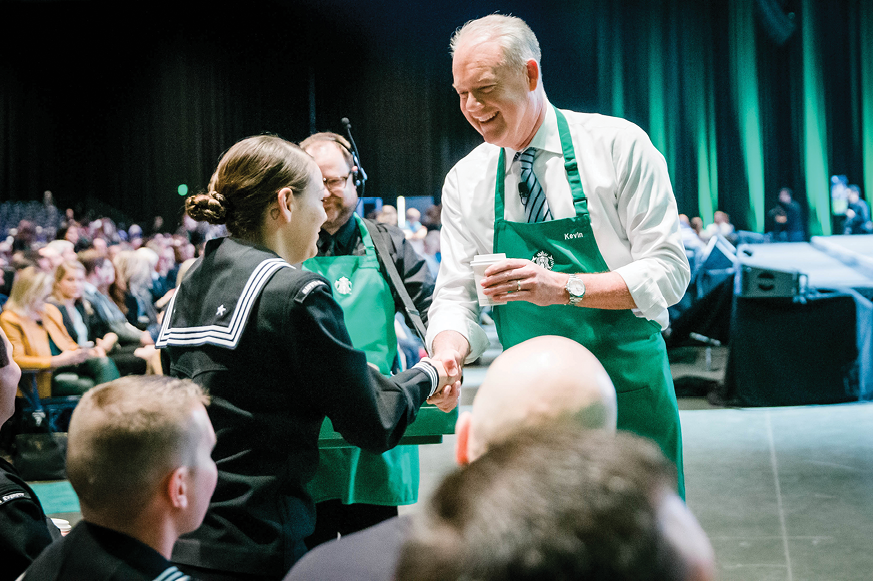
Kevin Johnson with stakeholders at a
2019 Starbucks annual meeting
How do you define Starbucks’ mission and purpose?
Our Starbucks mission statement is to inspire and nurture the human spirit – one person, one cup and one neighborhood at a time. That means leading a team that honors and uplifts, every single day, our partners and customers, and to listen and understand their concerns and make them ours. We prioritize initiatives that promote equality and inclusion, address complex problems in our communities, and emphasize sustainability across the business. Simply, we believe pursuing profit should never be in conflict with the pursuit of doing good.
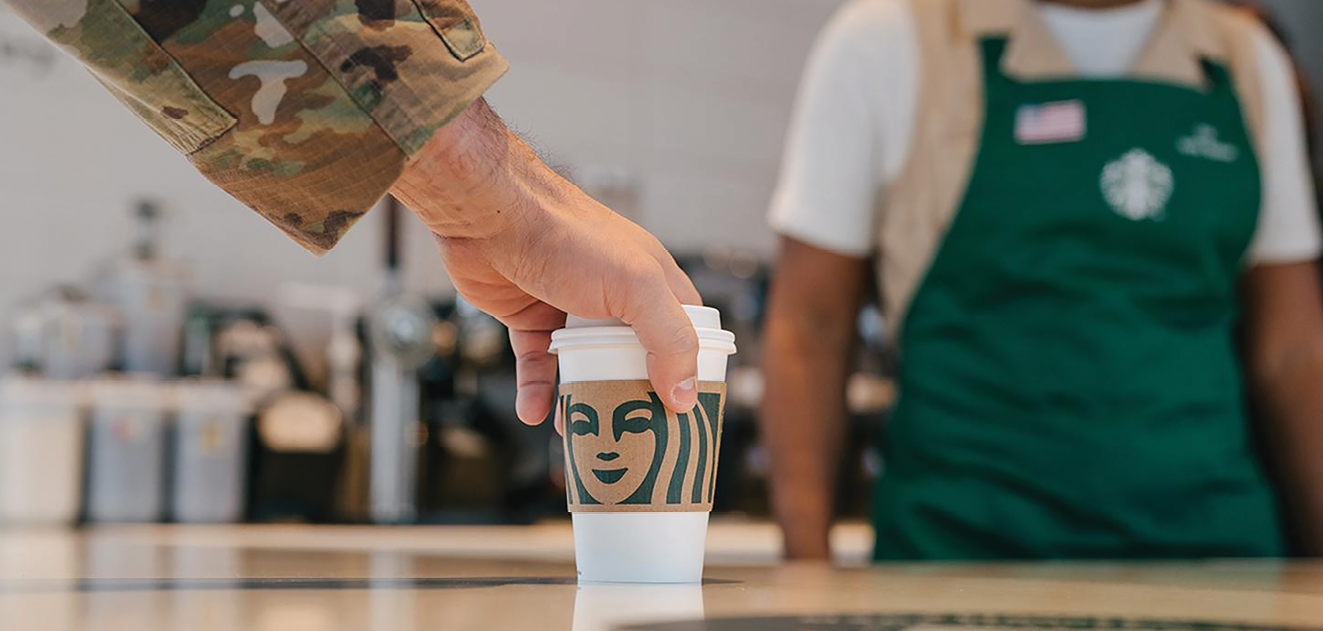
Starbucks honoring those who have served in
the armed forces on Veterans Day
What have been the keys to Starbucks’ consistent strength and leadership and how do you describe the Starbucks difference?
Starbucks is a people first company, and our strength comes from listening, engaging and empowering partners in making decisions. One of the key attributes of Starbucks is the concept of distributed leadership. We are 400,000 partners (employees) in 84 markets around the world with 34,000 stores. We can move with consistency and speed when we remain grounded and connected emotionally to a common mission, to live a set of values and have common beliefs. From there, each unique situation calls for an opportunity to establish principles. With a principled approach, partners then understand the playbook and are empowered to make their own decisions that are appropriate for their market and unique circumstances. This has been a superpower through moments of quick turn and localized decision-making.
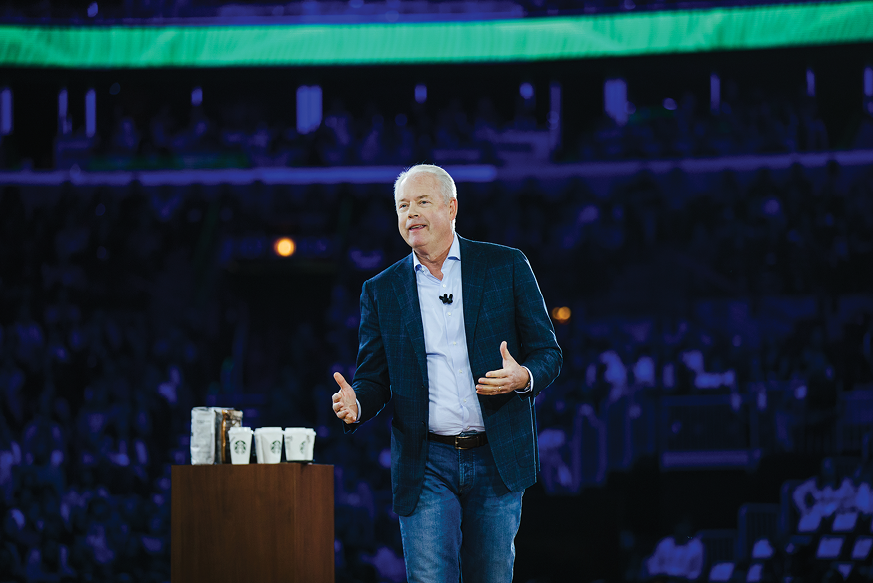
Kevin Johnson speaking at a Starbucks leadership
experience in Chicago
Where do you see the greatest opportunities for growth for Starbucks and how critical is it for Starbucks to maintain its culture as it continues to grow and scale?
We see tremendous growth opportunities, specifically in the U.S. and in China. We’ve found that even through the pandemic, our new stores in China performed extremely well. We’re looking at opening 700 net new stores to position ourselves very well post-pandemic. Another area of growth we’re leaning into is our strategic partnerships. We’ve just introduced Starbucks BAYA Energy drinks that are a joint venture between Starbucks and PepsiCo.
As a company with a 50-year history built on bringing together people and communities, Starbucks is perfectly positioned to take advantage of the Great Human Reconnection that has already begun.
Over the past four and a half years, Starbucks’ market capitalization has more than doubled and still, the total global addressable coffee market is expected to eclipse $400 billion in the next three years. That represents an 8 to 9 percent compound annual growth rate. With our scale and vision, we can grow even faster. By focusing on consumer behavior, we can innovate new beverage platforms, expand digital customer relationships and create new store formats. We can introduce the Starbucks Experience to a growing number of customers and satisfy their shifting preferences.
Our partners, cafes, and great coffee are foundational to so many narratives – from first dates to job interviews to daily get-togethers. With a presence in 34,000 communities worldwide, Starbucks is interwoven into the fabric of our lives. People depend on Starbucks which is an awe-inspiring responsibility and ever-expanding opportunity. Together, in partnership with all of our stakeholders, we are up to the challenge.
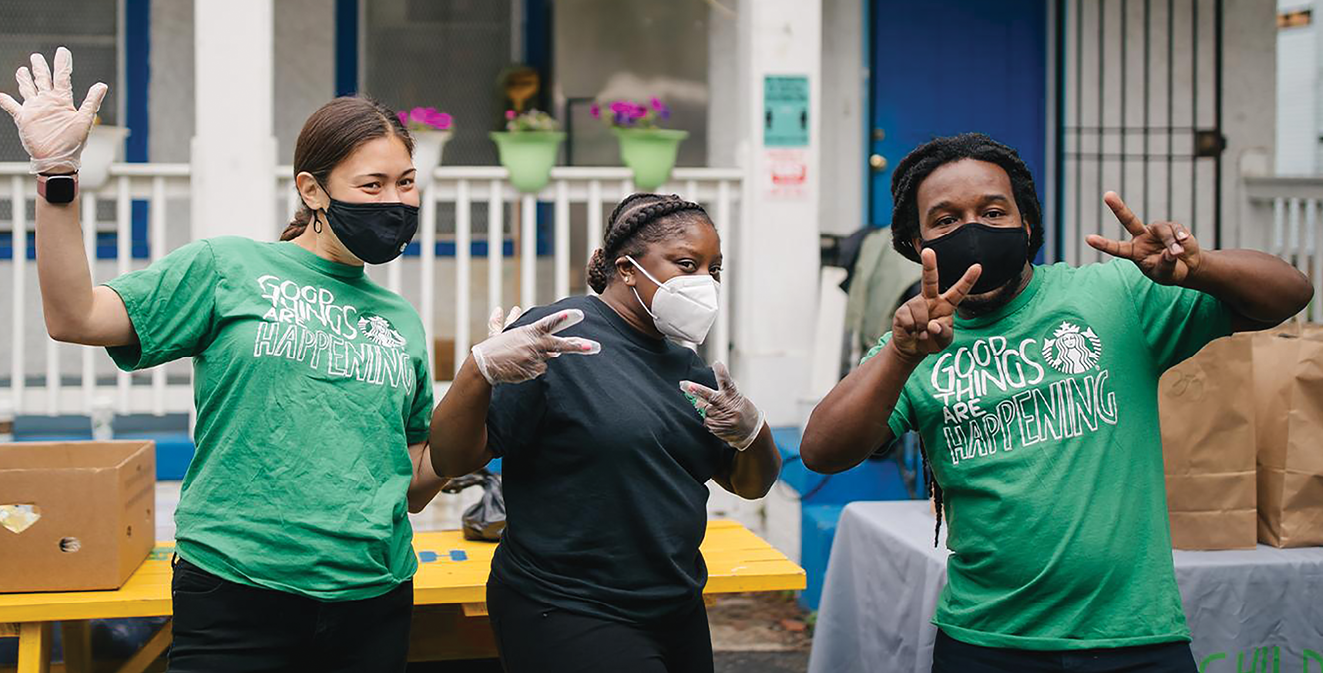
Celebrating Starbucks’ equity and inclusion journey
How did Starbucks adapt the way it works to address the challenges caused by the pandemic and how proud are you to see the resilience of your workforce during this unprecedented time?
I am in awe of the way our partners have responded and persevered through the last three years. In the face of immense uncertainty, our partners continued to show up and support their communities every single day.
To navigate the pandemic, as I alluded to earlier, we put together a framework of three principles to guide our decision-making. The first was to prioritize the health and safety of partners, and by extension customers. The second principle was to cooperate with local health and safety and government officials. Third, in a uniquely Starbucks way, we set out a principle to show up in a positive way for the communities we serve. We implemented new store safety protocols, provided economic certainty to our fellow partners, and invested in comprehensive COVID-19 care and benefits. We are responding to these unprecedented times by investing in our people, caring for our planet and staying committed to growth-at-scale. This people-positive, planet-positive and profit-positive agenda worked in harmony prior to COVID-19; worked in harmony during the pandemic; and will work and thrive in a post-COVID world.
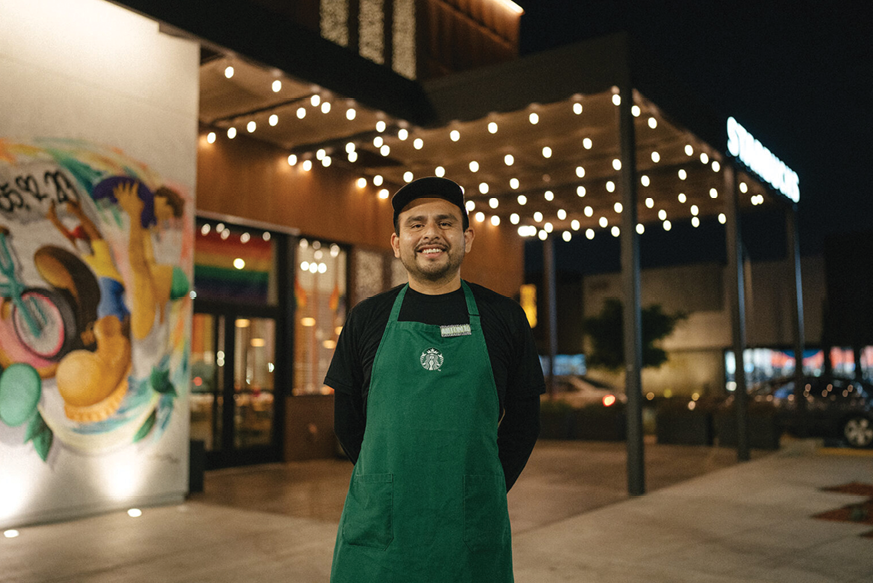
A Starbucks employee participating in one
of the company’s food share journeys
What is the impact of technology on Starbucks’ business and how do you make sure that technology does not take away from the human touch and personal relationship that Starbucks is known for?
This is such an important question. We believe in a relentless focus of technology and innovation on and in service of partners and customers – of making day-to-day life easier and better for partners and elevating every aspect of the customer experience.
Starbucks has been able to develop and harness technology that enhances the Third Place experience we are proud to provide. One example of this is through our industry-leading Starbucks App. The look and menu subtly change with the season the same way the stores do, you can personalize an order, access the store’s playlist, and buy and send gift cards. There’s a seamless transition between in-store and the virtual customer experience.
We believe in partner-driven innovation and, in that spirit, we opened the Tryer Lab. It’s an innovation center where anyone – from partners who work at the Starbucks Support Center to baristas in the field – could have an idea, put it to the test, and learn and adapt quickly. It’s all about eliminating this fear of failure and embracing the celebration of work. Not every innovation has to work for 34,000+ stores – some of them are specific to certain markets which keeps that personal touch in all that we do.

Starbucks’ reusable cups are another example
of its commitment to sustainability
How critical is it for Starbucks to build a diverse and inclusive workforce to mirror the diversity of its customers and the communities it serves?
It’s mission critical. Quite literally. Our increased focus on diversity, inclusion and opportunity has turned into a broader evolution of our culture at Starbucks. We always note that we are on a journey – one that requires us all to work together to advance racial and social equity on behalf of our partners and the communities we serve. I always come back to three principles: intention, transparency and accountability.
That is, as we consider the role and responsibility of Starbucks, as a company, to lead by example in areas of inclusion, diversity and equity, we will be intentional about the actions we take and how they line up with our mission and values, commit to transparency with all stakeholders about our thinking and our goals, and hold ourselves accountable.
We want everyone who walks into our stores to feel welcome, seen and accepted. The best way to understand the unique needs and challenges of communities is to have its members represented within our workforce. Greater diversity will enable us to make more thoughtful and inclusive decisions.
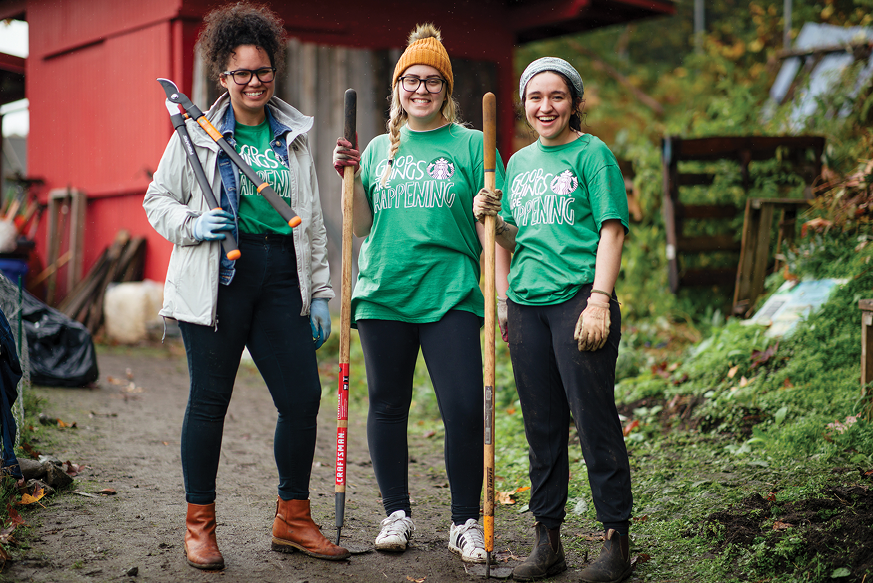
Starbucks’ employees supporting the company’s
commitment to sustainability
What do you see as Starbucks’ responsibility to its communities and how ingrained is corporate responsibility in Starbucks’ culture?
Community is a word that carries such tremendous weight at Starbucks. As a member of 34,000 communities around the world, we recognize a responsibility to strengthen each and every one. We know very well that our impact in communities is most meaningful when our efforts begin with our partners who know their neighbors best.
That impact comes to life in so many ways, whether it’s through food donation and service to address hunger relief, granting financial support to nonprofit organizations through The Starbucks Foundations, providing disaster relief to communities in need, or building Starbucks community stores which are dedicated to providing economic opportunity in rural and urban communities across the U.S. Our community stores, in particular, make me so proud as they are focused on hiring locally, creating dedicated space for communities to come together for events featuring local artists and working with diverse contractors for store construction and remodels. But that’s all just the beginning. It’s not only a responsibility we feel to strengthen communities, it’s an opportunity for our partners to show up, feel proud and be a part of something bigger than themselves.
What do you feel are the keys to effective leadership and how do you describe your management style?
My journey has been an interesting one in that I’ve seen several founder to successor transitions from Microsoft to Juniper to now my own at Starbucks. It seems simple, but I believe in authenticity. As a leader, you have to be willing to be your authentic self; to lean into vulnerabilities and to have a growth mindset each day. As I also mentioned, I believe in distributed leadership – to empower the day-to-day work from a singular individual to a team of amazing partners who are responsible for carrying the company’s soul forward. So, I let leaders think through and even struggle with decisions, and even to make mistakes. That’s how we often find our most impactful, meaningful work. We are here to support each other, learn from each other and get better every day. I find that by putting trust into the right people, you get amazing results.
What advice do you offer to young people beginning their careers during this challenging and uncertain time?
Don’t be afraid of failure, push yourself out of your comfort zone and be a lifelong learner.![]()